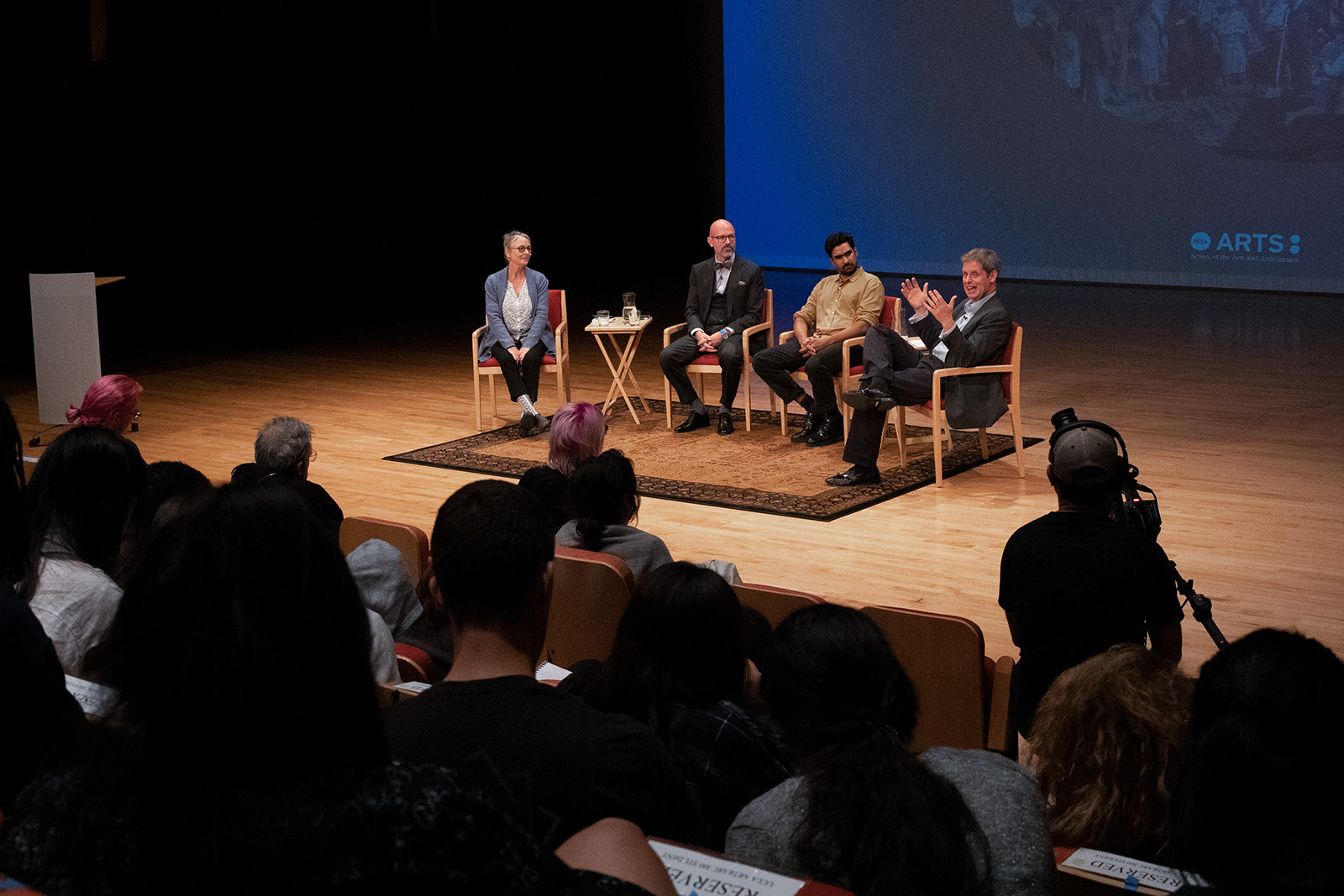Artist, theologian, lawyer contemplate truth in latest installment of ’10 Questions’

Victoria Marks, a professor in the UCLA School of the Arts and Architecture, lead a theologian, an artist and a First Amendment scholar in a discussion that sought to answer the question: What is truth? (Courtesy of UCLA Arts)
By Shelby Dunagan
Oct. 23, 2019 6:00 p.m.
This post was updated Oct. 23 at 11:38 p.m.
Theologian Jason Sexton said the university was established in order to search for and discover meaningful truths.
Sexton, a visiting research scholar for UCLA’s California Center for Sustainable Communities, spoke at a panel discussion called “What is Truth?” The panel was hosted by the UCLA School of the Arts and Architecture as part of the centennial edition of the “10 Questions” program.
Every Tuesday night from Oct. 1 through Dec. 3, faculty, students and alumni gather for a panel discussion in Glorya Kaufman Hall led by experts in various fields to explore one of 10 questions in an attempt to spur conversations from multiple perspectives. Other panels have discussed such questions as “What is a University?”, “What is Knowledge?” and “What is Justice?”
Victoria Marks, a professor in the UCLA School of the Arts and Architecture, introduced the topic by explaining the necessity of truth in a new digital age and in a world of changing political norms.
Marks gave many examples of ways she believes President Donald Trump’s administration has tried to limit the truth, such as removing information about climate change on the White House website or claiming “fake news” throughout the president’s impeachment inquiry.
Prior to the event, Marks asked students what they perceive truth to be and shared their varying responses to the audience at the introduction of the event.
“Truth is the driver of all inquiry. Truth is the ultimate reflection of reality. One alone cannot know truth fully,” Marks read from audience responses. “Truth is something we constantly strive to uncover because it shapes our understanding of ourselves and the world around us.”
Sexton, along with Eugene Volokh and Vishal Jugdeo, were the three panelists discussing what truth means to them given their particular field of expertise. Sexton said the answer to getting to the truth is loyalty.
“Truth does not accommodate belief. Belief must accommodate truth,” Sexton said. “The answer is loyalty and the relevance of this for democracy, for freedom, for open inquiries and loyalty to a higher ideal.”
Sexton added the truth will not always be easy to find, but we must strive for it.
“We’ll force ourselves to take those hard truths not because it’s pleasant or attractive, but because we’re driven by a deeper commitment to truth in a higher sense,” Sexton added.
Volokh, a First Amendment scholar and professor of law at UCLA, said he understands truth using his lens as a lawyer.
Volokh said although our legal system attempts to search for the truth, it cannot be paralyzed by the lack of evidence present and must ultimately make decisions.
“We trust the legal system to find out who the murderers are, who the rapists and robbers are. The legal system recognizes that the truth of a particular case may be hard to know,” Volokh said. “Given the limitations of evidence and the limitations of human decision-making, our grasp of the truth can be quite limited, but it doesn’t mean that we can just proceed without making decisions.”
Jugdeo, an artist and assistant professor of art at UCLA, said the question of truth does not need to be answered because what is true for one person may not be true for someone else.
“The question of truth is not something that I think about as an artist,” Jugdeo said. “I think I’m far more interested in the subtle kind of nuances in everyday lived experiences and how it is that we can relate to one another.”
Clara Auguste, a graduate student in UCLA’s Department of World Arts and Cultures/Dance who attended the event, said truth is subjective and can be interpreted differently based on one’s perspective.
“I believe that truth is highly dependent on the individual and in which context one goes about the world,” Auguste said. “It can be entirely fact-based depending on how one views the world, but for me, I choose to let experiences and time dictate what I consider to be true.”
The next question to be explored in the “10 Questions” series is “What is Love?” and will take place Tuesday in Kaufman Hall.


